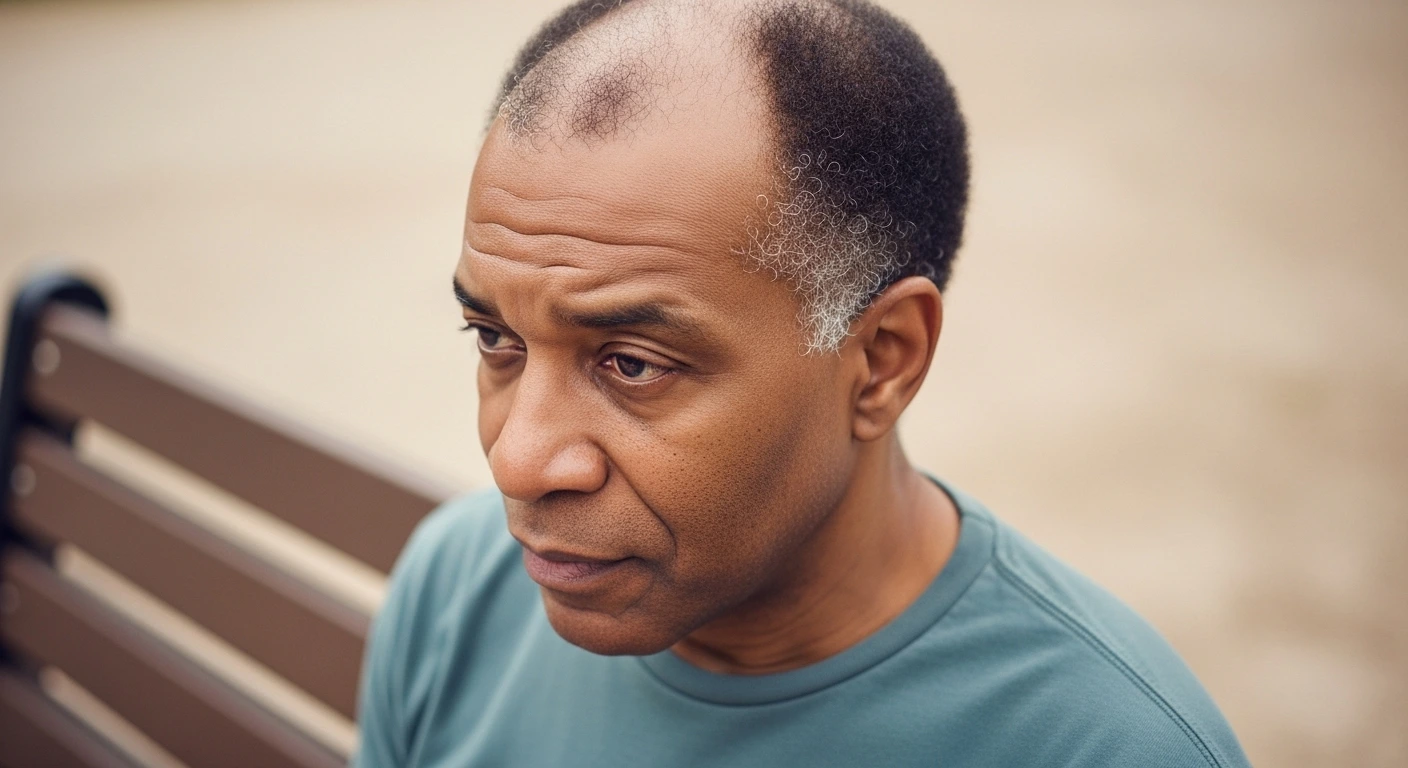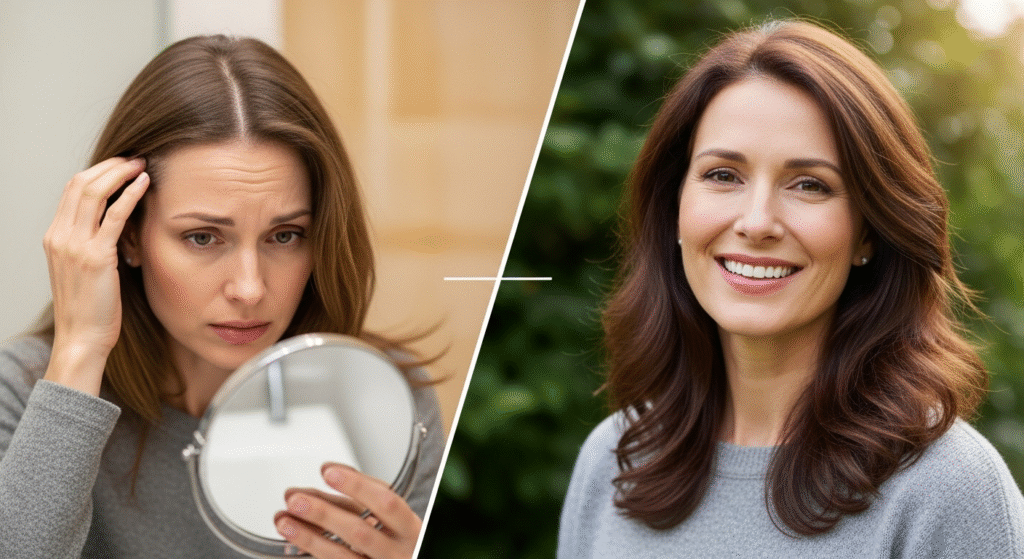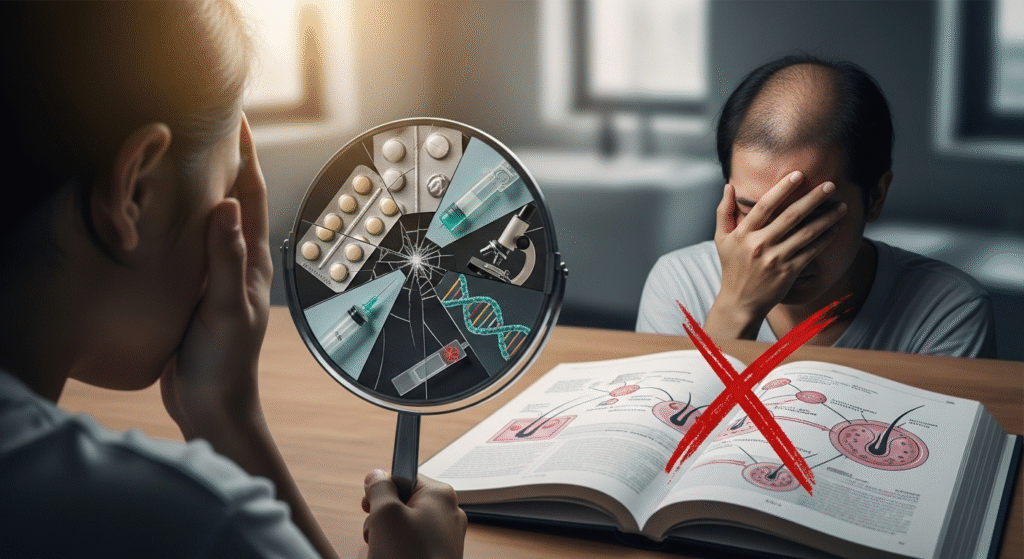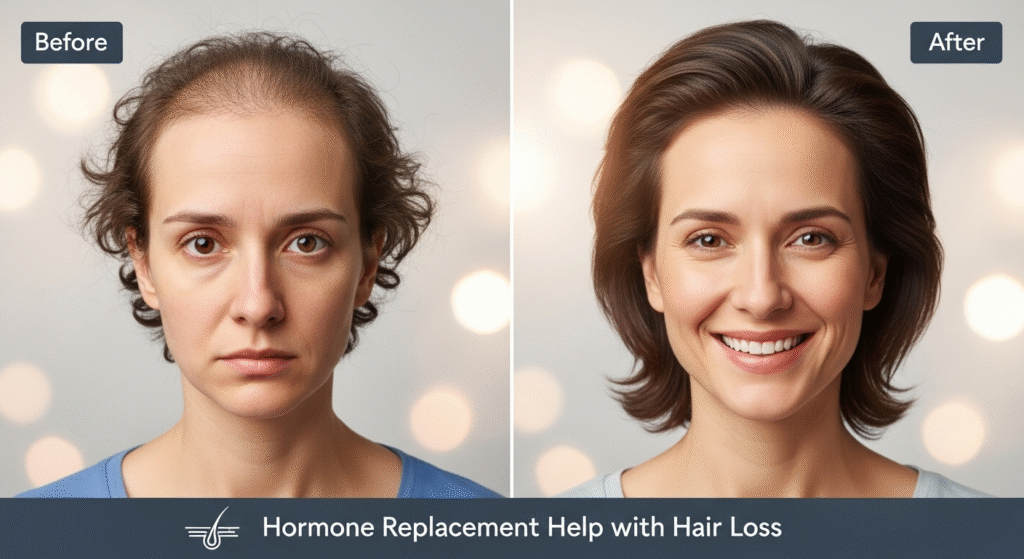Hair loss is a common concern, particularly for those experiencing hormonal changes. Many wonder that Can Hormone Replacement Help with Hair Loss issue. In this article, we'll explore how HRT can influence hair health, its potential benefits, and possible alternatives. By reading through, you'll gain insight into whether HRT could be a viable solution for …
Hair loss is a common concern, particularly for those experiencing hormonal changes. Many wonder that Can Hormone Replacement Help with Hair Loss issue. In this article, we’ll explore how HRT can influence hair health, its potential benefits, and possible alternatives.
By reading through, you’ll gain insight into whether HRT could be a viable solution for your hair loss and what other options may be available. Let’s dive in and examine this topic based on expert advice.

Understanding Hormonal Influence on Hair Growth
The Hair Growth Cycle and Hormonal Impact
Our hair goes through different phases: the anagen (growth), catagen (transitional), and telogen (resting) phases. Hormones, especially estrogen and progesterone, play a key role in supporting hair growth by extending the anagen phase. When these hormone levels drop, as seen during menopause, the hair follicles can shrink, resulting in thinning hair or increased shedding.
Estrogen encourages a longer, healthier hair growth cycle, which is why many women notice thicker, fuller hair during their reproductive years. On the other hand, a drop in estrogen and a rise in androgens (male hormones like testosterone) during menopause can lead to a type of hair loss called androgenic alopecia.
Common Hormonal Causes of Hair Loss
- Menopause: The decline in estrogen levels often triggers thinning hair in women during menopause.
- PCOS (Polycystic Ovary Syndrome): This condition causes an imbalance in female hormones and increases androgens, which can lead to hair loss, especially on the scalp.
- Thyroid Imbalances: Both underactive (hypothyroidism) and overactive (hyperthyroidism) thyroids can cause hair thinning and shedding.
Can HRT Help with Hair Loss?

Estrogen-Based HRT and Hair Health
Estrogen-based hormone replacement therapy can be an effective solution for those experiencing hair loss related to hormonal imbalances. By replacing the estrogen lost during menopause, HRT can help stimulate hair growth and reduce shedding. Clinical studies have shown that estrogen can prolong the anagen phase, which may prevent further hair thinning and promote healthier hair follicles.
HRT could potentially restore the balance that allows your hair to grow back thicker and stronger. However, results may vary from person to person, and it’s important to consult with a healthcare provider to determine whether HRT is the right choice.
Progesterone and Testosterone in HRT
While estrogen helps with hair growth, the role of progesterone and testosterone in HRT can be more complex. Progesterone helps counteract some of the negative effects of testosterone, particularly in terms of balancing the body’s response to androgenic hormones. However, some people using HRT may still experience increased testosterone levels, which could potentially exacerbate hair loss due to increased DHT (Dihydrotestosterone) levels—a key culprit in androgenic alopecia.
Bioidentical vs. Synthetic Hormones
The type of hormones used in HRT (bioidentical or synthetic) can also affect hair health. Bioidentical hormones are molecularly identical to those produced by the body and may have a more natural effect on hair growth. On the other hand, synthetic hormones may not always have the same beneficial impact. It’s essential to choose the right type of HRT after a thorough discussion with your healthcare provider.
When HRT May Not Be Effective for Hair Loss

Factors Influencing HRT’s Efficacy
Not everyone will experience the same results with HRT. The effectiveness of HRT for hair loss largely depends on individual factors, including:
- Age: Younger women may not see as significant an improvement as those who are further into menopause.
- Underlying Conditions: If you have other conditions like PCOS or thyroid imbalances, HRT alone may not solve the issue.
- Dosage and Timing: The specific dosage and timing of HRT administration can significantly impact its effectiveness in promoting hair growth.
Risks and Side Effects of HRT
While HRT can help with hair loss, it also carries certain risks and side effects. Some individuals may experience scalp hair thinning as a result of increased testosterone levels, or other side effects like:
- Mood swings
- Acne
- Weight fluctuations
As with any treatment, discussing potential side effects with your doctor is crucial before starting HRT.
Alternative Treatments for Hormonal Hair Loss
Topical Solutions
For those who don’t respond well to HRT or prefer non-hormonal options, there are several alternatives available:
- Minoxidil: FDA-approved for female pattern hair loss, Minoxidil can stimulate hair regrowth by improving blood circulation to the hair follicles.
- Ketoconazole Shampoo: This shampoo has anti-androgenic properties and may help block DHT from affecting hair follicles.
Medical Interventions
- Spironolactone: An anti-androgen medication that blocks the effects of testosterone and DHT.
- Platelet-Rich Plasma (PRP) Therapy: Involves injecting your own blood plasma into the scalp to stimulate hair growth.
Lifestyle and Dietary Considerations
Maintaining a balanced diet and managing stress are essential for optimal hair health. Hair-boosting nutrients, such as biotin, vitamin D, and zinc, can promote stronger hair growth. Additionally, practicing stress reduction techniques may help prevent hair loss caused by anxiety or hormonal imbalances.
Expert Insights and Patient Experiences

Dermatologist and Trichologist Perspectives
According to Dr. Rana Irfan, a dermatologist specializing in hair restoration, “HRT can be a valuable treatment for many women facing hormonal hair loss. However, it’s important to tailor the treatment to individual needs. Combining HRT with other therapies, like Minoxidil or PRP, can often enhance results.”
Real-Life Testimonials
Many women have reported positive results from HRT, especially when it’s part of a comprehensive treatment plan. One patient shared, “After starting HRT, I noticed less hair shedding and even some regrowth after about six months. It was a game-changer for me.”
FAQs
Q1: How long does it take to see results from HRT for hair loss?
It can take anywhere from 3 to 6 months to see visible improvements in hair thickness and density.
Q2: Can HRT cause hair loss?
While HRT generally helps with hair growth, some individuals may experience shedding, especially if testosterone levels increase.
Q3: Is HRT suitable for younger women experiencing hair loss?
HRT may not always be the best option for younger women. It’s crucial to consult with a healthcare provider to discuss other potential causes of hair loss and treatment options.
Q4: What are the alternatives to HRT for hair restoration?
Alternatives like Minoxidil, PRP therapy, and anti-androgen medications can also be effective for treating hormonal hair loss.
Conclusion
Hormone replacement therapy can indeed help with hair loss caused by hormonal imbalances, particularly in women undergoing menopause. However, its effectiveness depends on various factors, and it’s essential to discuss potential risks and benefits with a healthcare provider.
If you’re looking for more personalized treatment options, consult with a specialist to create a plan that works for your unique needs.
If you’re considering HRT for hair loss or exploring other treatment options, schedule a consultation with Dr. Uzma Irfan, an ISHRS-certified surgeon in Islamabad today to discuss personalized solutions for your hair health. Don’t wait—take control of your hair restoration journey now!






